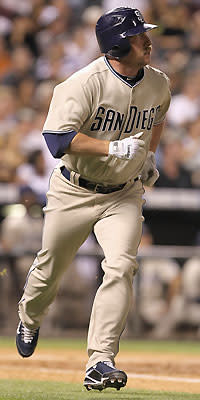Stairs one-ups his old pal Giambi in a pinch
DENVER – In an increasingly button-down, walkup-music, cool-to-be-cool world, Matt Stairs(notes) and Jason Giambi(notes) come from a place where shaving is optional, a cold beer can be reward enough and one good, hard hack soothes the soul.
Giambi is coming up on 40. Stairs passed it a couple seasons back. They carry themselves as slightly used warriors bearing the scars of their summers, round in areas, gray in others.
They were raised on the same grounds. Giambi breezed through the minor leagues and surfaced with the Oakland A’s in the spring of 1995. Stairs, who hadn’t breezed at all, arrived a year later.
In five seasons by the bay, Stairs hit 122 home runs and drove in 385 runs. Giambi, in seven years there, had 187 home runs and 685 RBI. And they had a good time.
“We enjoyed being big leaguers,” is how Stairs put it.
Some 15 years later, they find themselves on opposite ends of the same division race, taking the at-bats where they come, often enough when the dew has gathered on the outfield grass, and the crowd is leaning in, and the closer has been waved in.
It’s a living, and a good one.
“It’s like being a closer,” Giambi said. “You gotta have that mentality enjoying being in pressure situations.
Tuesday night, the out-of-town scoreboard at Coors Field told them all the Philadelphia Phillies had won, the Atlanta Braves had lost and the San Francisco Giants would have to come back to win. They wouldn’t.
Here, the San Diego Padres sent Stairs to bat in the eighth inning, leading by a run. In 438 previous plate appearances as a pinch-hitter, he’d hit a record 21 home runs. He’d made a lot of outs.
Giambi sat in the Colorado Rockies’ dugout, along the first-base line, waiting his turn, making occasional trips to the indoor cage. He’s newer to the role, but made more capable in it when Stairs advised him to find a regular routine and to get after the first hittable pitch, because there might not be another. He’d hit a couple home runs in his first season coming off the bench, and win a couple games, and make a lot of outs.
In the final few weeks of September, as the National League West and wild-card races see leads and deficits change by the hour, Stairs and Giambi will have their say. They’ll be sent out cold to win games or lose them, to hunt fastballs and punish them with backspin. Or to bow their heads and wait for another day.
And so on an unseasonably warm night on Blake Street, with the Padres holding to a half-game lead over the Giants and a 2½-game lead over the Rockies, Stairs and Giambi poured themselves into what would become a 7-6 Padres win.
Stairs dug a groove into the left-hander’s batters box with 11 choppy kicks with his left foot. He held his bat chest high and got three fastballs from Rafael Betancourt(notes). The third he hit over the center-field wall, Dexter Fowler(notes) left dangling vainly atop the fence.
Asked before the game what he knew about pitching to Stairs, Rockies lefty Joe Beimel(notes) had said, “That he crushes a fastball. No matter how hard you throw it you can’t throw it by him.”
Betancourt’s arrived at 93 mph, and left as a 6-3 Padres lead.
“As soon as your name’s called, I don’t care if you’re 22 or 42, the adrenaline comes,” Stairs had said, hours before he found his fastball.
Told about Beimel’s scouting report, Stairs smiled.
“You know it too, huh?” he said.
About those 20 years from 22 to 42, Stairs said, “The only thing that’s changed is you don’t see the inside fastball anymore.”
Betancourt’s was outside. Didn’t matter.
Six batters came and went in the Rockies’ eighth, and another four in the ninth before Giambi climbed the stairs from the dugout. He swung a lead stick over his head and eyed the Padres’ closer, Heath Bell(notes). Stairs had made his play, the Rockies had come back, and Rockies manager Jim Tracy was holding Giambi, trusting the moment would come.
He’d seen his Rockies, winners of 10 in a row before Monday night’s game against these Padres, rally back to within a run. Against Bell, they’d scored twice in the ninth, had a runner at first, and still hadn’t spent Giambi.
“I was waiting,” Tracy said. “Waiting.”
With more than 40,000 standing, they too waiting – on Giambi, on one more run, on another Rocktober – Giambi dug a little wider the gash Stairs had left. He held his bat higher, near shoulder level. He’s five inches taller than Stairs, maybe 40 pounds heavier, and tattooed.
“The book,” Padres manager Bud Black said, “says you don’t want the go-ahead run to get to first base. But, you find good closers have a knack to work their ways through an inning. I don’t know whether Heath was thinking that, but the way Giambi’s been swinging the bat … he looks to be locked in. In hindsight, it wasn’t a bad walk.”
On five pitches, Giambi did not swing. The game ended on the next hitter, when Eric Young(notes) Jr. grounded into a double play, the tying and go-ahead runs stuck in the throats of those 40,000 folks.
The Padres led the West by 1½ games. The Rockies were 3½ games back.
Giambi left the home clubhouse with half a smile.
“See you tomorrow,” he said.


